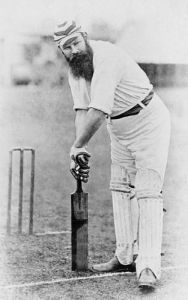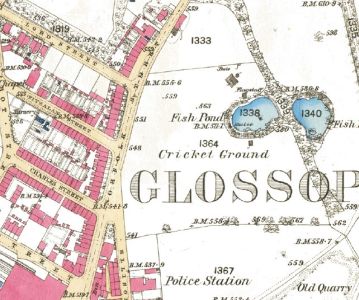
W G Grace in 1883, Public domain, via Wikimedia Commons. |

Clip from OS Map 1879 showing location of the old cricket ground. |

W G Grace in 1883, Public domain, via Wikimedia Commons. |

Clip from OS Map 1879 showing location of the old cricket ground. |
|
United South |
|
|
W.G. Grace c Barber b Hickton |
74 |
|
H. Jupp run out |
2 |
|
W.R. Gilbert b. Greenwood |
1 |
|
J. Phillips e Platt b Greenwood |
1 |
|
G.F. Grace c Wild b Greenwood |
13 |
|
F. Silcock b Greenwood |
8 |
|
Charlwood c Rhodes b Hickton |
2 |
|
R. Humphrey run out |
1 |
|
E. Pooley c & b Greenwood |
0 |
|
J. Lillywhite c Hunt b Greenwood |
4 |
|
J. Southerton not out |
16 |
|
|
121 |
|
|
Overs |
Maidens |
Runs |
Wickets |
|
Hickton |
56 |
30 |
58 |
2 |
|
Greenwood |
55 |
26 |
63 |
6 |
|
Glossop Twenty-Two - First Innings |
|
|
Second Innings |
|
|
S. Clarke b Southerton |
4 |
|
b Southerton |
4 |
|
Wild st Pooley b W.G. Grace |
1 |
|
c Southerton b Lillywhite |
3 |
|
J. Walton c Jupp b Southerton |
0 |
|
c W.G. b Lillywhite |
6 |
|
T. Foster st Pooley b W. G. Grace |
1 |
|
b Lillywhite |
3 |
|
M.J.B. Reyner b Southerton |
0 |
|
tun out |
7 |
|
Rev C.B. Ward b Southerton |
3 |
|
c Silcock b Southerton |
7 |
|
Mr. W.H. Hunt t o Humphrey |
7 |
|
b Lillywhite |
0 |
|
T. Howarth b W.G. Grace |
2 |
|
b Lillywhite |
8 |
|
Barber c Jupp b Southerton |
0 |
|
b Southerton |
0 |
|
J. Sellars c Gilbert b W.G. Grace |
1 |
|
b Southerton |
1 |
|
M. Walton c & b W.G. Grace |
0 |
|
not out |
3 |
|
L. Greenwood b Southerton |
7 |
|
c W.G. b Lillywhite |
3 |
|
W. Hickton c Southerton b W.G. |
0 |
|
c Phillips b Lillywhite |
7 |
|
P. Dalgliesh b Southerton |
0 |
|
run out |
2 |
|
R. James c Southerton b W.G. Grace |
1 |
|
run out |
3 |
|
Harrop c G.F. Grace b W.G. Grace |
0 |
|
c Gilbert b Lillywhite |
I |
|
Thorpe c Humphrey b W.G. Grace |
0 |
|
st Pooley b Lillywhite |
0 |
|
G. Williamson b Southerton |
0 |
|
st Pooley b Southerton |
0 |
|
Mr. W.S. Rhodes b Southerton |
4 |
|
st Pooley b Southerton |
0 |
|
Knott c W. Grace b Southerton |
0 |
|
c Pooley b Lillywhite |
3 |
|
G. Platt not out |
7 |
|
c. Gilbert b Southerton |
4 |
|
H. Sellars c Lillywhite b Southerton |
0 |
|
c Jupp b Southerton |
2 |
|
Extras |
1 |
|
Extras |
1 |
|
|
39 |
|
|
68 |
|
|
Overs |
Maidens |
Runs |
Wickets |
|
|
Overs |
Maidens |
Runs |
Wickets |
|
Southerton |
18.1 |
10 |
18 |
11 |
|
Lillywhite |
27 |
14 |
16 |
11 |
|
W.G. Grace |
18 |
7 |
20 |
9 |
|
Southerton |
27 |
7 |
51 |
8 |
|
Eleven - First Innings |
|
United - 2nd Innings |
||
|
W.G. Grace b MacIntyre |
35 |
|
lbw b Watson |
13 |
|
R. Humphrey c Watson b MacIntyre |
1 |
|
c and b MacIntyre |
1 |
|
Schofield c Platt b MacIntyre |
0 |
|
b. MacIntyre |
3 |
|
G.F. Grace b MacIntyre |
9 |
|
c Gee b Thorpe |
18 |
|
Gilbert b MacIntyre |
9 |
|
c Watson b MacIntyre |
12 |
|
Hearne thrown out Harrop |
6 |
|
b Foster |
8 |
|
Silcock st Smith b Watson |
2 |
|
not out |
22 |
|
Henty b Watson |
1 |
|
b MacIntyre |
6 |
|
Fillery not out |
3 |
|
c Platt b Clark |
8 |
|
Howitt c Clark b Watson |
2 |
|
b MacIntyre |
0 |
|
Neild absent |
0 |
|
c Regan b MacIntyre |
0 |
|
Extras |
0 |
|
Extras |
5 |
|
Total |
68 |
|
Total |
96 |
|
|
Overs |
Maidens |
Runs |
Wickets |
|
|
Overs |
Maidens |
Runs |
Wickets |
|
MacIntyre |
27 |
13 |
30 |
5 |
|
MacIntyre |
19 |
11 |
21 |
6 |
|
Watson |
26.1 |
10 |
38 |
3 |
|
Watson |
15 |
9 |
16 |
1 |
|
|
|
|
|
|
|
Thorpe |
8 |
9 |
18 |
1 |
|
|
|
|
|
|
|
Clarke |
7 |
2 |
7 |
1 |
|
|
|
|
|
|
|
Foster |
9 |
1 |
15 |
1 |
|
|
|
|
|
|
|
Wild |
4 |
2 |
2 |
0 |
|
|
|
|
|
|
|
Bowers |
9 |
1 |
12 |
0 |
|
Twenty-two |
|
Twenty-two - 2nd Innings |
Bat order - 2nd Innings |
||
|
V Watson lbw b G.F. Grace |
1 |
|
b. Silcock |
1 |
17 |
|
Rev. C.B. Ward c G.F. b W. Grace |
3 |
|
c W. Grace b Gilbert |
0 |
10 |
|
J. Thorpe b W.G. Grace |
0 |
|
run out |
0 |
9 |
|
H Platt lbw b W.G. Grace |
0 |
|
c and b W. Grace |
0 |
7 |
|
S. Clark b G F. Grace |
12 |
|
run out |
8 |
8 |
|
C. Regan c sub b W.G. Grace |
16 |
|
b W. Grace |
1 |
12 |
|
R. James b G.F. Grace |
1 |
|
c Silcock b W. Grace |
0 |
1 |
|
W.H. Hunt b G.F. Grace |
9 |
|
not out |
0 |
19 |
|
H. Harrop run out |
8 |
|
st Henty b W.G. Grace |
3 |
2 |
|
A Smith (capt) b W.G. Grace |
2 |
|
b Silcock |
11 |
16 |
|
T. Foster lbw b W.G. Grace |
22 |
|
b. W. Grace |
10 |
6 |
|
W. MacIntyre b W.G. Grace |
1 |
|
st Henty b Silcock |
26 |
13 |
|
T. Howarth b W.G. Grace |
2 |
|
st Henty b Gilbert |
6 |
5 |
|
A Wild st Henty b W.G. Grace |
8 |
|
c and b Gilbert |
11 |
3 |
|
J. Walton lbw b W.G. Grace |
1 |
|
c Henty b Hearne |
4 |
18 |
|
W. Howe c and b W.G. Grace |
0 |
|
hw b W.G. Grace |
3 |
4 |
|
Fox Gee c W.G. Grace b Gilbert |
3 |
|
to bat |
|
|
|
J. Harrop c G.F. Grace b Gilbert |
2 |
|
b. Hearne |
0 |
14 |
|
J. Bowers b Gilbert |
6 |
|
to bat |
|
|
|
J. Thewells c Henty b Gilbert |
3 |
|
to bat |
|
|
|
G. Williamson st Henty b Gilbert |
11 |
|
b. Silcock |
1 |
15 |
|
J. Hallsworth not out |
0 |
|
c W. Grace b Gilbert |
1 |
11 |
|
Extras |
3 |
|
Extras |
5 |
|
|
Total |
114 |
|
Total |
91 |
|
|
|
Overs |
Maidens |
Runs |
Wickets |
|
|
Overs |
Maidens |
Runs |
Wickets |
|
W.G. Grace |
43 |
14 |
68 |
12 |
|
W.G. Grace |
21 |
6 |
30 |
6 |
|
G.F. Grace |
27 |
13 |
28 |
3 |
|
W.R. Gilbert |
220 |
6 |
36 |
4 |
|
Gilbert |
16 |
8 |
15 |
5 |
|
Silcock |
10 |
6 |
11 |
4 |
|
|
|
|
|
|
|
Hearne |
9 |
4 |
9 |
3 |